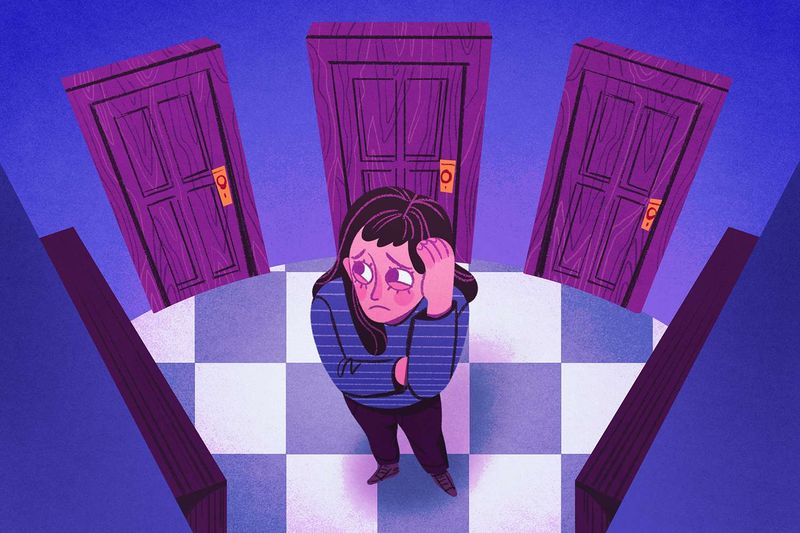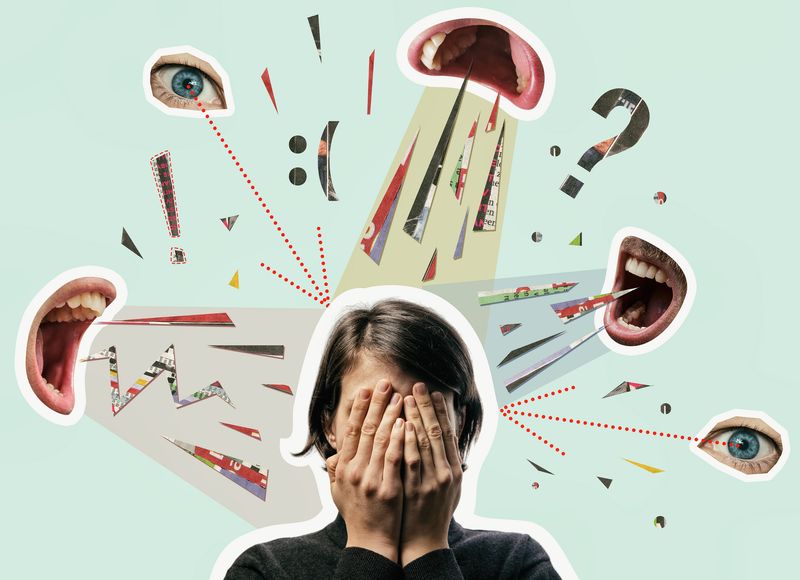The Quiet Damage: 17 Ways Living With a Narcissistic Spouse Slowly Wears You Down
You don’t wake up one day and realize, “I’m being emotionally drained.” It happens quietly. Slowly. Subtly. When you’re married to a narcissist, the damage doesn’t always come in the form of loud arguments or public drama. Instead, it shows up as the silence after you speak your truth.
The guilt you feel for having normal emotions. The exhaustion from constantly second-guessing yourself. And the worst part? You start to believe it’s you. Your fault. Your flaw. Your failure. But it’s not.
This kind of emotional wear and tear is exactly what narcissistic behavior does best—it breaks you down quietly, piece by piece, until you forget who you were before it started.
Today, we’re unpacking 17 subtle signs of damage that often go unnoticed when living with a narcissistic spouse—and offering clarity where confusion has lived for far too long.
1. You start doubting your memory—and your reality.

They twist stories, deny what was said, and convince you that you’re the one misremembering. “Maybe I am overreacting…” you think, as doubt creeps into the corners of your mind.
It’s like a psychological funhouse mirror, distorting your perception until you can’t trust your intuition. You’re left questioning whether your feelings are valid, or if you’re overly sensitive.
This constant gaslighting makes you second-guess everything—from what you had for breakfast to how your partner truly feels about you. It’s not just frustrating; it’s exhausting, and slowly erodes your confidence.
2. You forget who you used to be.

The vibrant, confident version of you fades away, replaced by a quieter, more withdrawn persona. You find yourself shrinking, playing small to avoid conflict and criticism.
It’s like watching a colorful painting slowly lose its hue, each brushstroke dulled by their relentless critique. The joyful, spontaneous parts of you are boxed away as you tiptoe around their expectations.
You become disconnected from the passions and quirks that once defined you, and slowly, you stop recognizing the person staring back at you in the mirror.
3. You feel lonely—even when they’re right next to you.

Their emotional unavailability creates a chasm between you, a void that’s felt even in shared silences. You’re together, but the connection is hollow.
It’s the kind of loneliness that gnaws at your core, leaving you to navigate life’s joys and challenges without a supportive partner by your side.
In a world where you should feel cherished, you’re left feeling invisible, your heart echoing with unfulfilled desires for closeness and understanding.
4. You constantly walk on eggshells.

Every word, every gesture feels like a potential landmine. You filter your tone, your words, your needs—desperately avoiding the triggers that lead to their unpredictable outbursts.
Despite your careful navigation, you’re often blamed for conflicts that aren’t your doing, leaving you perpetually on edge.
This constant vigilance drains your energy, turning simple interactions into high-stakes negotiations, where peace is always just out of reach.
5. You second-guess your emotions.

Feelings that once seemed clear become tangled in a web of self-doubt. You find yourself questioning whether you’re overreacting, or if your hurt is justified.
Their skillful deflection turns even your most authentic emotions into a source of guilt. You’re left in a cycle of confusion, unsure if you should trust your heart or their dismissive words.
It’s a maddening dance, where you’re always a step behind, trying to reconcile what you feel with what they claim is true.
6. You perform “happy” for others while crumbling inside.

To the outside world, it’s all smiles and small talk. You wear the mask of happiness effortlessly, fooling even those closest to you.
Behind closed doors, however, lurks silence, blame, and emotional withdrawal. The disparity between your public and private life grows, creating a dissonance that’s hard to reconcile.
You’re not just acting happy; you’re living a double life, with the weight of unspoken pain pulling you further from your true self.
7. You apologize for things you didn’t do.

It becomes easier to just take the blame—even when you’re not at fault. Apologizing smooths things over, providing a temporary peace amidst the chaos.
However, peace at any price starts costing you dearly. With each undeserved apology, a piece of your self-respect erodes, leaving you a little smaller, a little more invisible each time.
This cycle not only diminishes your confidence but also reinforces their control over your emotional landscape.
8. You start blaming yourself for their behavior.

You wonder if you’re too emotional, too needy, or too critical. Their manipulative narratives seep into your psyche until you start questioning your own worth.
But really? You’re just human—trying to survive emotional manipulation in a landscape where empathy is scarce.
This internalized blame doesn’t just erode your confidence; it fosters a toxic guilt, perpetuating the cycle of control they’ve cunningly crafted.
9. You stop sharing your true feelings.

Once, you were open—sharing your dreams, fears, and desires freely. But when every vulnerability was mocked, dismissed, or used against you, you learned to keep things bottled up.
Now, your inner world remains a secret, a sanctuary that no longer invites them in. It’s safer this way, but the silence is quietly breaking you down.
Over time, this self-imposed isolation becomes suffocating, as the lack of authentic expression leaves you feeling more alone than ever.
10. You isolate yourself from friends and family.

Maybe they subtly discourage your connections, or maybe you’re too exhausted to keep pretending everything is fine.
As your support system fades, their hold on you tightens. Friends and family become distant memories, reflections of a life where you were once free to be yourself.
This isolation doesn’t just affect your relationships; it strengthens the unhealthy balance of power, making it harder for you to escape the emotional captivity.
11. You start to numb out.

Laughter feels rare, and passion seems like a distant memory. You stop crying, not because it doesn’t hurt, but because you’re exhausted from the constant hurt.
You find yourself moving through life in a haze, where each day blends into the next, void of the colors that once filled your world.
This emotional numbing is a defense mechanism, a way to cope with the relentless psychological assault, but it comes at the cost of your vitality and zest for life.
12. You struggle to make decisions without their approval.

Even the simplest decisions feel loaded, as you’ve been conditioned to defer, shrink, or apologize.
You find yourself seeking their approval, not out of love, but out of a learned helplessness that undermines your autonomy.
This dependency isn’t just limiting; it’s disempowering, leaving you trapped in a cycle where your confidence is perpetually undermined, and your choices feel endlessly scrutinized.
13. You normalize dysfunction.

What would’ve once shocked you now feels routine. Coldness, dismissiveness, and gaslighting have become your new “normal.”
This gradual shift in your perception blurs the lines between acceptable and abusive, making it harder to recognize the need for change.
As the chaos becomes familiar, you find yourself defending behaviors you once deemed unacceptable, all in the name of maintaining a semblance of harmony.
14. You get stuck in the cycle of hope and hurt.

They’re warm, then cruel. Affectionate, then distant. Each good moment keeps you hanging on, while the damage continues to accumulate.
This cycle isn’t just confusing; it’s addictive, creating an emotional rollercoaster that’s hard to step off.
The yo-yo effect of hope and hurt leaves you in a perpetual state of longing, always waiting for the next sweet moment to make everything better, even if it’s fleeting.
15. You start to believe this is all you deserve.

And that’s the final blow. Once they convince you to abandon yourself, they no longer have to control you—you’ll do it for them.
This belief that you’re undeserving of love, respect, or happiness traps you in a cycle of self-sabotage.
It’s a heartbreaking surrender, as the echoes of their manipulation embed themselves into your self-perception, convincing you that this diminished existence is all you’re worth.
16. You lose your sense of self-esteem.

With every critical comment, your self-esteem takes a hit. You start questioning your worth and competence, feeling inadequate even in your strengths. Gradually, the vibrant individual you once were fades, replaced by a shadow of insecurity.
The constant need for validation from your spouse eclipses your inner voice, distorting your self-perception. In time, you might struggle to recognize your own achievements and qualities.
A life entangled with narcissism chips away at your confidence, leaving you vulnerable and dependent on external approval to feel valued. This psychological erosion is both subtle and profound.
17. You become hyper-vigilant to avoid conflict.

Living with a narcissistic spouse often means tiptoeing around emotional landmines. You become hyper-aware of potential triggers that could lead to conflict, altering your behavior to maintain peace.
This constant state of alertness drains your energy and heightens anxiety, making relaxation elusive. The effort to preemptively avoid conflict is exhausting, leaving you emotionally depleted.
The hyper-vigilance impacts your mental well-being, creating a persistent undercurrent of stress. Over time, it becomes second nature, as if treading through a minefield, with no reprieve in sight.







